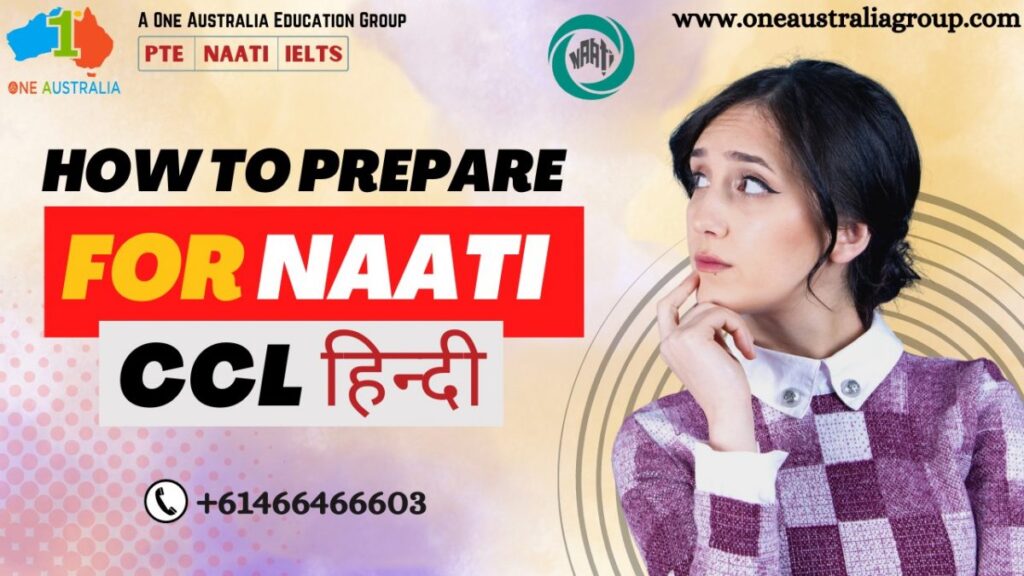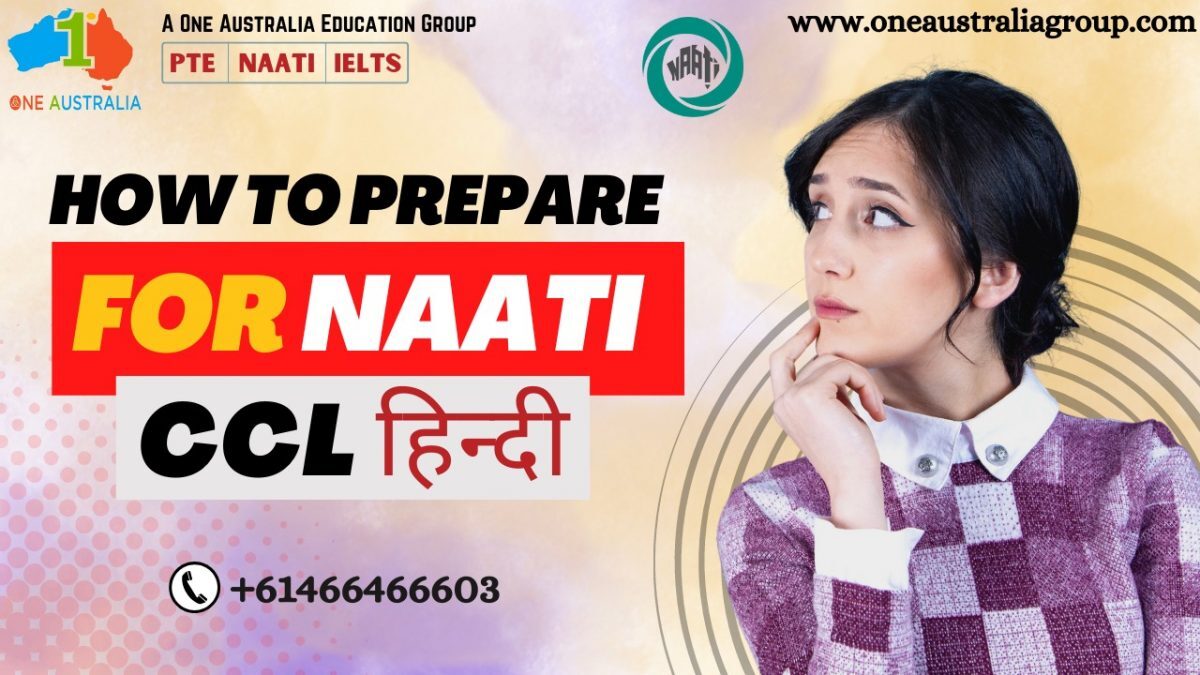How to prepare for NAATI CCL HINDI

For those looking to get an Australian Permanent Residency, the NAATI CCL test is a huge blessing, as successfully completing this test can give you 5 extra PR points.
Although the test is easier than the PTE or the IELTS and takes only around 20 minutes to complete, it still proves to be quite difficult for those who are taking it.
This is a relatively recent test to be introduced for the purpose of PR, and hence is still not completely understood by many test-takers.
NAATI CCL is available in a number of languages, including Hindi, Telugu, Sinhalese, Spanish, Gujarati, Malayalam, Punjabi etc.
✅ FIRST STEP
THE FIRST STEP in preparing for the NAATI CCL Hindi is to understand the structure of the test.
✅ NAATI is different from PTE and IELTS because it is completely delivered online, which means you do not have to be physically present in Australia to do the test.
✅ The test consists of two recordings. Each recording has a dialogue between a native English speaker and a native Hindi speaker.
✅ Each dialogue recording has roughly 300 words, half in English and half in Hindi.
✅ The topics covered in these dialogues can range from Business, Consumer Affairs, Employment, Health, Immigration/Settlement, Community, Education, Housing, Insurance, Financial, Legal and Social Services.
✅ SECOND STEP
THE SECOND STEP is to know how you are going to be marked for this test.
You will be marked on your:
✅ Language Quality – competency in both English and Hindi
✅ Language Register – the level of formality with which a candidate transfers the meaning
✅ Marks will be deducted for any errors that you make, so only answer when you are sure.
✅ Each dialogue is worth 45 marks. In order to pass the test, the candidate needs 29 out of 45 in each dialogue.
✅ THIRD STEP
THE THIRD STEP is to practise all the material that is available to you and get adequate feedback.
If you follow all the tips below, you can get the score you want.
However, it isn’t always possible to follow each step accurately on your own, that is why A One Australia has all the facilities available for NAATI Hindi Coaching to create a study plan tailored for you that you can follow easily.
✅ Timetable scheduling – Creating an accurate timetable for your weeks of study prior to the exam is very important.
Using a timetable, you can make sure you learn every section of the test well and get all the practise you require. This systematic approach to studying will give you an advantage over others.
✅ Memory skills and note-taking – In NAATI CCL, you are not just expected to provide the meaning of the dialogue, but you also need a high degree of accuracy.
Working on your memory retention will tremendously work in your favour. However, even a sharp memory can be overloaded, and note-taking becomes of utmost importance in those situations.
There will be a number of situations you will hear about, and cultivating the habit of writing down essential points will help you give a more accurate answer.
✅ Practice everyday vocabulary – The dialogues you will get are based on certain topics but still use a lot of common and day to day words and phrases.
There are words used in dialogues of the different topics that are frequently used in these tests.
When doing practise tests and looking at previous tests, make a list of repeating vocabulary and keep revising those words to the best of your ability.
✅ Focus more on your weaker language – If you consider English to be your weaker language, then completely immerse yourself in practising that language, especially in the context of Australia.
As is mentioned above, the test focuses on many different fields of life, try reading as much as you can about social conversations regarding those topics.
✅ Ask for repetition – Students are allowed one repetition per dialogue, but often in the heat of the moment and with exam pressure, they forget to claim that.
Listen carefully to the dialogue, make your notes and ask for repetition when you are ready. This can assure the highest level of accuracy in your answer.
✅ Mock tests – Doing mock tests is the most effective way to assure that you have a good understanding of the NAATI Hindi test.
These tests are a good way to make sure that any dialogue you hear in the actual test does not intimidate you. Our website and the NAATI Ninja app offer a range of mock tests that you can download and practise.
If you want a more structured mock test time table, then A One Australia has a mock test every Saturday, which means you can take four mock tests in a month.
Maintaining this schedule tracks your progress and gives you enough time to practise in between each test.
✅ Coaching and Feedback – If you want to take your practising one step forward and have an aim to get a very high score, then NAATI Hindi coaching classes are the best way to go about that.
Learning from teachers who are experts in this field will elevate your skills and assure that you get the score that you dream of.
A One Australia Group provides NAATI Hindi coaching, which includes daily classes, including weekends, practise sessions with teachers, and vocabulary and note-taking classes as well.
After a few sessions with us, you will become more confident in your abilities. We offer an in-depth study of every single module of the test and train you with various techniques that have proven to work very well for other students before.
You can expect valuable and insightful feedback on your work, which can help you identify your weaker areas that need to be worked on. With some extra coaching with us, it becomes easy to get the 5 extra points you need for your PR.
Now get your NAATI online Coaching in just 4 easy installments through Afterpay
You can checkout our Unlimited Combo Pricing Packages
By following the strategies mentioned above, you can be confident of getting a good score on your NAATI CCL Hindi test. Good Luck with your exam!
Don’t hesitate to contact us. Leave a message with your name on WhatsApp on +61466466603, and we will get back to you!



